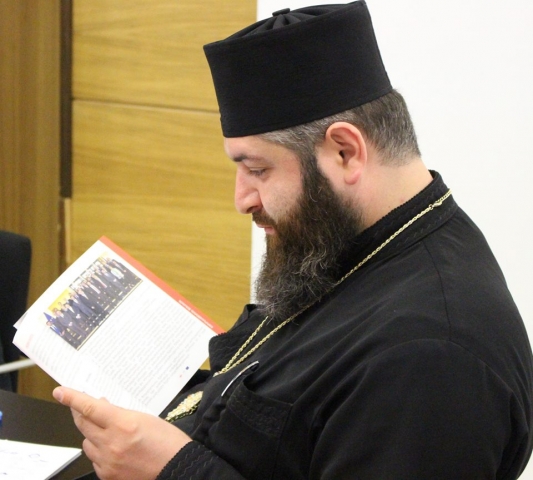Church Representatives Attend Trainings to Enhance EU Knowledge
TBILISI – The Center for Development and Democracy in Georgia held a series of trainings for representatives of the Georgian Orthodox Church this week to help promote knowledge about the European Union and its importance for the small South Caucasus nation of 3.7 million.
For more than a decade the Georgian government has enthusiastically embraced and pursued staunchly pro-Western foreign policies, with the main goal being to eventually join the bloc of European countries.
The majority of Georgian society, however, remains deeply conservative as xenophobic church leaders and those reared in Soviet ideology remain powerful voices in the country’s weak civil society.
A poll by the International Republican Institute in 2014 found that the church had the highest (94 per cent) approval rating of all political and social institutions in Georgia.
According to the organizers of the training, the goal of three-day series of workshops is to provide information to church representatives, and thoroughly explain the importance of the EU for Georgia, including how Georgians benefit from visa-free travel to other European countries.
The organizers admitted that a campaign of anti-Western, anti-EU disinformation is spreading in local society – particularly amongst members of the church circles.
“The clergy of the Georgian Orthodox Church has a major influence over Georgian society, and many people follow exactly what the priests tell them during church services. Our goal is to discuss EU society with the clergy, and together we can have an effective dialogue with society,“ Mikheil Mirziashvili, the Chairman of Board of the Center for Development and Democracy, said.
“There was a lot of negative information about the EU in our community but after the meetings, this changed. Now we know more facts about other European countries and the importance of Georgia being a member of this family. This will positively influence the future of our country too,” Nino Vekua, a teacher at St. Ioane's Bolneli Orthodox School in Bolnisi said.
A young priest Dimitri Vekua, who participated in the workshop, said the training would have a huge impact on the dialogue between the church and the rest of society.
“Ordinary citizens and church representative have regular relations with each other. We trust one another and what we are saying. After theses trainings, we will share our new knowledge about the EU with our parishioners,” Vekua said.
More than 3 million Georgian citizens were expecting to receive visa-free travel to Europe’s Schengen Zone beginning early this summer until Germany suddenly backtracked on its previous support. The EU is now making it easier to suspend visa waivers for countries wishing to move closer towards European integration.
A visa-free regime for Georgians would allow easier access - but not the legal right to work - for up to 90 days in Europe’s Schengen Zone of most EU states and several non-EU members.
By Tamar Svanidze
Edited by Nicholas Waller
Photo: CDD












